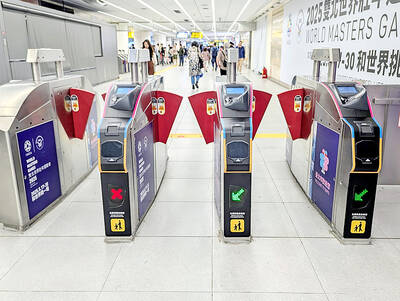An international academic conference in Taipei on Friday called for “compassion in learning” and urged a stronger focus on the emotional well-being of students and academic staff.
National Taiwan Normal University (NTNU) hosted the Social, Emotional and Ethical Learning conference, which it co-organized with the Lizen Education Foundation, based in Yunlin County’s Douliou City (斗六). The conference was followed by a two-day workshop on Cognitively-Based Compassion Training, a system of contemplative exercises designed to enhance and sustain compassion.
“People in the modern age pursue happiness and enjoyment, which they believe are determined by things outside of themselves,” NTNU Department of Educational Psychology and Counseling professor Chen Hsueh-chih (陳學志) said.
However, many people ignore the need to “explore their inner self,” he added.
Chen cited an experiment in which students were asked to wait in a room for 15 minutes without using their smartphones.
More than half of them could not bear the boredom and were willing to get electric shocks to alleviate it, he said.
“This indicates that most young people rely on outside stimulation and lack the ability to connect with their inner self,” Chen said.
The principles of social, emotional and ethical learning are derived from the teachings of the Dalai Lama, especially his concept that people have a basic requirement for love, compassion and forgiveness, Emory University pedagogy professor Lobsang Tenzin Negi said.
Amid the mounting challenges the world is facing, all societies must undergo a spiritual revolution that should start in education, said Negi, who heads Emory University’s Center for Contemplative Science and Compassion-Based Ethics.
An increasing number of children are facing mental health issues, Negi said, citing international studies.
Most of these problems originate in children’s families and the learning environment in elementary and junior-high schools, Negi said, calling those environments “key to their development of well-rounded emotional health.”
Educational concepts increasingly focus on guiding students toward self-discovery, as well as methods to control their emotions and increase their concentration, he said.
Meanwhile, many curriculums still focus on “outside skills,” Negi said, urging an increased focus on “the spirituality of the inner self.”
Emory University social, emotional and ethical learning program coordinator Tsondue Samphel also attended the event.
Lizen Education Foundation chairman Kan Ming-yuan (甘銘源) said his organization has introduced experimental education programs and is working to revitalize farming villages in Yunlin County.
It is also collaborating with Emory University, based in Atlanta, Georgia, to set up a social, emotional and ethical learning platform in Taiwan, he said.
Kan, who works as an architect focused on climate change-resilient low-carbon buildings, said Emory University’s learning concept approaches education holistically.
It stipulates that there is an intricate balance linking all living things and nature, and urges its adherents to care for the environment, he said.
“We must grant human rights to the environment and not just utilize it like a consumer product,” Kan said.
EAST AND WEST
NTNU executive vice president Sung Yao-ting (宋曜廷) said that there is common ground between the wisdom of the East and the West.
The ancient Chinese sages introduced the utopian ideals of global harmony and universal love, but such ideals have seldom been achieved, Sung said, adding that there is a greater need for harmony in the world today.
Social, emotional and ethical learning programs help students overcome mental problems and might help society overcome future challenges, Sung said.

A magnitude 6.4 earthquake struck off the coast of Hualien County in eastern Taiwan at 7pm yesterday, the Central Weather Administration (CWA) said. The epicenter of the temblor was at sea, about 69.9km south of Hualien County Hall, at a depth of 30.9km, it said. There were no immediate reports of damage resulting from the quake. The earthquake’s intensity, which gauges the actual effect of a temblor, was highest in Taitung County’s Changbin Township (長濱), where it measured 5 on Taiwan’s seven-tier intensity scale. The quake also measured an intensity of 4 in Hualien, Nantou, Chiayi, Yunlin, Changhua and Miaoli counties, as well as

Credit departments of farmers’ and fishers’ associations blocked a total of more than NT$180 million (US$6.01 million) from being lost to scams last year, National Police Agency (NPA) data showed. The Agricultural Finance Agency (AFA) said last week that staff of farmers’ and fishers’ associations’ credit departments are required to implement fraud prevention measures when they serve clients at the counter. They would ask clients about personal financial management activities whenever they suspect there might be a fraud situation, and would immediately report the incident to local authorities, which would send police officers to the site to help, it said. NPA data showed

ENERGY RESILIENCE: Although Alaska is open for investments, Taiwan is sourcing its gas from the Middle East, and the sea routes carry risks, Ho Cheng-hui said US government officials’ high-profile reception of a Taiwanese representative at the Alaska Sustainable Energy Conference indicated the emergence of an Indo-Pacific energy resilience alliance, an academic said. Presidential Office Secretary-General Pan Men-an (潘孟安) attended the conference in Alaska on Thursday last week at the invitation of the US government. Pan visited oil and gas facilities with senior US officials, including US Secretary of the Interior Doug Burgum, US Secretary of Energy Chris Wright, Alaska Governor Mike Dunleavy and US Senator Daniel Sullivan. Pan attending the conference on behalf of President William Lai (賴清德) shows a significant elevation in diplomatic representation,

The Taipei MRT is to begin accepting mobile payment services in the fall, Taipei Rapid Transit Corp said on Saturday. When the company finishes the installation of new payment units at ticketing gates in October, MRT passengers can use credit cards, Apple Pay, Google Pay and Samsung Pay, the operator said. In addition, the MRT would also provide QR payment codes — which would be compatible with Line Pay, Jkopay, iPass Money, PXPay Plus, EasyWallet, iCash Pay, Taiwan Pay and Taishin Pay — to access the railway system. Currently, passengers can access the Taipei MRT by buying a single-journey token or using EasyCard,